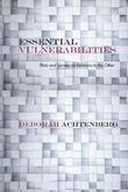Explore

In Essential Vulnerabilities, Deborah Achtenberg contests Emmanuel Levinas’s idea that Plato is a philosopher of freedom for whom thought is a return to the self. Instead, Plato, like Levinas, is a philosopher of the other. Nonetheless, Achtenberg argues, Plato and Levinas are different. Though they share the view that human beings are essentially vulnerable and essentially in relation to others, they conceive human vulnerability and responsiveness differently. For Plato, when we see beautiful others, we are overwhelmed by the beauty of what is, by the vision of eternal form. For Levinas, we are disrupted by the newness, foreignness, or singularity of the other. The other, for him, is new or foreign, not eternal. The other is unknowable singularity. By showing these similarities and differences, Achtenberg resituates Plato in relation to Levinas and opens up two contrasting ways that self is essentially in relation to others.
This book is included in DOAB.
Why read this book? Have your say.
You must be logged in to comment.
Rights Information
Are you the author or publisher of this work? If so, you can claim it as yours by registering as an Unglue.it rights holder.Downloads
This work has been downloaded 240 times via unglue.it ebook links.
- 104 - pdf (CC BY-NC-ND) at OAPEN Library.
- 110 - pdf (CC BY-NC-ND) at Unglue.it.
Keywords
- !bisac PHILOSOPHY / Ethics & Moral Philosophy
- !bisacsh PHILOSOPHY / Ethics & Moral Philosophy
- Emmanuel Levinas
- Ethics & moral philosophy
- God
- Hippias
- Humanities
- KUnlatched
- Meno
- Phaedrus (dialogue)
- Philosophy
- PHILOSOPHY / Ethics & Moral Philosophy
- Plato
- Socrates
- thema EDItEUR::Q Philosophy and Religion::QD Philosophy::QDT Topics in philosophy::QDTQ Ethics and moral philosophy
Links
DOI: 10.2307/j.ctv3znz3rEditions

